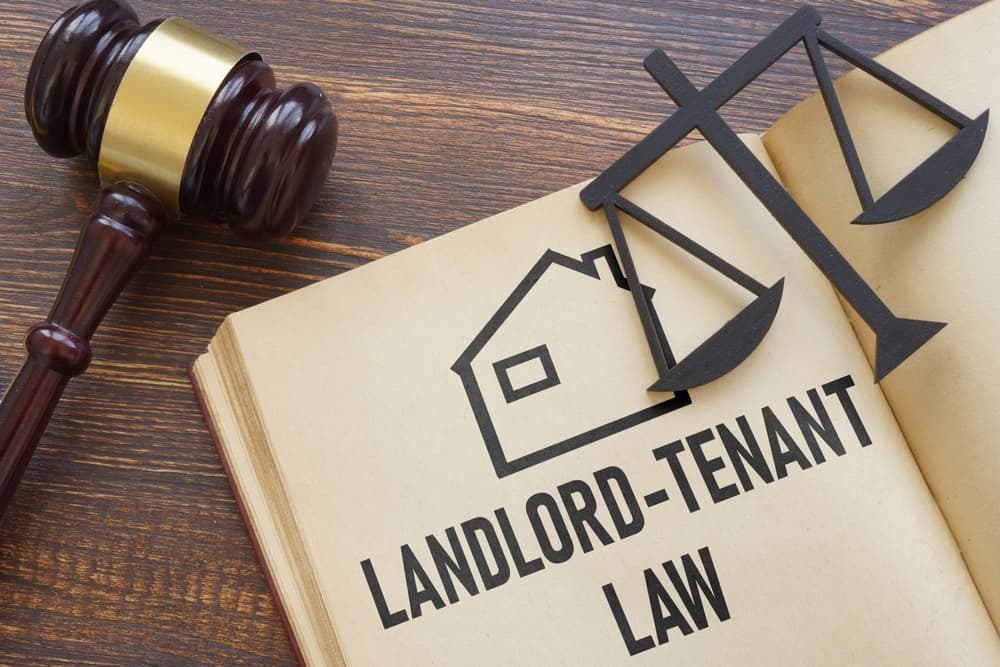Landlord-Tenant Rights and Responsibilities in Washington State

Navigating the landlord-tenant relationship can be complex and overwhelming. As a tenant, it is important to understand your rights and responsibilities to ensure a fair and lawful living arrangement. Similarly, landlords must be knowledgeable of their obligations to maintain a safe and habitable rental property. In Washington State, specific laws govern landlord-tenant relationships, including rules regarding rent payment, eviction procedures, repairs, and security deposits. If you find yourself facing a dispute or have questions about your rights or responsibilities, it is important to seek legal advice from an attorney who has a focus on landlord-tenant law. They can provide guidance and advocate for your rights, allowing you to have a clear understanding of the laws and ensure a fair resolution to any issues that may arise. Contact a landlord tenant lawyer near you to discuss your specific circumstances and protect your rights as a tenant or a landlord.
The Landlord-Tenant Relationship in Washington State

In Washington State, the relationship between a landlord and tenant is regulated by the Washington Residential Landlord-Tenant Act (RLTA). The RLTA sets forth the rights and responsibilities of both parties and provides a framework for resolving disputes. It is important for both landlords and tenants to familiarize themselves with the provisions of the RLTA to ensure a mutually respectful and legally compliant relationship.
The RLTA covers a wide range of topics, including rental agreements, rent payments, security deposits, repairs and maintenance, and eviction procedures. It establishes certain duties for landlords, such as maintaining a habitable property, responding to repair requests in a timely manner, and providing proper notice before entering a tenant’s unit. Tenants, on the other hand, have responsibilities such as paying rent on time, keeping the rental property clean and in good condition, and adhering to the terms of the rental agreement.
How the Washington Residential Landlord-Tenant Act Works

The RLTA provides a comprehensive set of guidelines and procedures for landlords and tenants to follow. Here are some key aspects of how the RLTA works in Washington State:
Rental Agreements
Under the RLTA, rental agreements can be either written or oral. However, it is always recommended to have a written agreement that outlines the terms and conditions of the tenancy. A written agreement can help clarify expectations and prevent disputes.
The RLTA requires rental agreements to include certain information, such as the amount of rent, the duration of the tenancy, and the responsibilities of both the landlord and the tenant. It also prohibits certain provisions that are considered unfair or discriminatory.
Rent Payments
The RLTA establishes rules regarding rent payments, including the frequency of payment and the methods accepted by the landlord. It also sets limits on late fees and provides guidelines for handling rent increases.
Landlords cannot raise the rent during the term of the rental agreement unless it is specifically allowed by the agreement. If a rent increase is allowed, the landlord must provide proper notice to the tenant.
Tenants have the right to dispute an unreasonable rent increase or a late fee that exceeds the limits set by the RLTA. In such cases, it is advisable to seek legal advice to understand your options and protect your rights.
Security Deposits
The RLTA regulates the collection and handling of security deposits. A security deposit is a sum of money paid by the tenant to the landlord to cover any damages beyond normal wear and tear or unpaid rent.
In Washington State, landlords can only charge a maximum of one month’s rent as a security deposit. They are required to provide a written receipt and must return the deposit within 14 days of the tenant moving out, along with an itemized list of any deductions.
Tenants have the right to dispute any improper deductions from their security deposit. If you believe that your landlord has wrongfully withheld your deposit, it is advisable to consult with a landlord-tenant attorney for guidance on how to proceed.
Tenant Rights in Washington State

Washington State provides several rights and protections for tenants. It is essential for tenants to understand these rights to ensure a fair and safe living environment. Here are some key tenant rights under the RLTA:
Right to a Habitable Property
One of the most fundamental tenant rights is the right to a habitable rental property. Landlords in Washington State are required to maintain the property in a condition that is safe, clean, and fit for human habitation. This includes ensuring proper maintenance, providing necessary repairs, and addressing any health and safety hazards.
If a landlord fails to fulfill their duty to provide a habitable property, tenants have the right to take legal action, such as withholding rent or seeking a court order for repairs. However, tenants should always consult with a landlord-tenant lawyer before taking any such action to understand their rights and obligations. A tenant needs to be careful before they take these self-help measures because they can be in breach of their lease agreement.
Right to Privacy
Tenants in Washington State have the right to privacy and the lawful use and enjoyment of their rental unit. Landlords must provide proper notice before entering a tenant’s unit, except in cases of emergency. The RLTA specifies the required notice period, which is generally 48 hours, and outlines the circumstances under which a landlord can enter the rental unit.
If a landlord violates a tenant’s right to privacy, the tenant may have grounds for legal action. An attorney who is skilled in landlord-tenant law can provide advice on how to address such violations and protect your privacy rights.
Right to Non-Discrimination
The RLTA prohibits landlords from discriminating against tenants based on protected classes, such as race, color, national origin, sex, religion, familial status, disability, or source of income. Landlords cannot refuse to rent to a tenant, impose different rental terms, or terminate a tenancy based on discriminatory reasons.
In addition, there are federal anti-discrimination laws that may allow you to take action against the landlord. The Fair Housing Act prohibits discrimination in housing based on your membership in a protected class. A landlord may not do the following:
- Refuse to rent housing to a tenant
- Discriminate in the terms of the rental
- Advertise the housing with any type of discriminatory preferences
- Interfere with someone’s housing rights or attempt to intimidate them
- Retaliate against a tenant for exercising their right to fair housing under the law.
If you believe that you have been a victim of housing discrimination, it is important to consult with a landlord tenant attorney who can assess your situation. They can guide you through the process of filing a complaint with the appropriate agency or a lawsuit against the landlord in court.
Landlord Rights and Responsibilities in Washington State
While tenants have certain rights, it is also important to recognize the rights and responsibilities of landlords. Here are some key landlord rights and obligations under the RLTA:
Right to Collect Rent
Landlords have the right to collect rent in a timely manner according to the terms of the rental agreement. They can set reasonable rental rates, charge late fees for overdue payments, and raise the rent when allowed by the agreement.
However, landlords must follow the rules and procedures outlined in the RLTA when it comes to rent collection. They cannot raise the rent during the term of the rental agreement unless specified, and they must provide proper notice for any rent increase.
Responsibility for Repairs and Maintenance
Landlords in Washington State have the responsibility to maintain a habitable property and address repair requests in a timely manner. This includes repairing faulty plumbing, heating, electrical systems, and any other conditions that negatively affect the tenant’s health and safety.
The RLTA provides guidelines for tenants to follow when requesting repairs. If a landlord fails to make necessary repairs, tenants may have legal remedies available to them, such as rent withholding or seeking a court order for repairs.
Right to Entry
While tenants have the right to privacy, landlords also have the right to enter a tenant’s rental unit under certain circumstances. The RLTA specifies the situations in which a landlord can enter the rental unit, such as for repairs, inspections, or emergencies.
However, landlords must provide proper notice to the tenant before entering, except in cases of emergency. The notice requirements are set by the RLTA and must be followed to respect the tenant’s right to privacy.
Common Disputes Between Landlords and Tenants in Washington State
Despite the existence of laws and regulations, disputes between landlords and tenants can still arise. Some common issues include:
Non-Payment of Rent
Non-payment of rent is a common dispute between landlords and tenants. If a tenant fails to pay rent, the landlord may initiate eviction proceedings. However, the RLTA provides certain protections for tenants, such as the opportunity to pay the outstanding rent before an eviction is finalized.
If you are facing eviction due to non-payment of rent or need assistance with rent payment arrangements, it is advisable to consult with a landlord tenant lawyer who can explain your rights and explore potential solutions.
Repairs and Maintenance
Disputes over repairs and maintenance are also common between landlords and tenants. If a landlord is not fulfilling their obligation to make necessary repairs, tenants may have legal remedies available to them, such as rent withholding or seeking a court order for repairs.
Conversely, tenants also have responsibilities when it comes to maintaining the rental property. Failure to keep the property clean and in good condition may lead to conflicts with the landlord.
Security Deposit Deductions
Another frequent source of conflict is security deposit deductions. Landlords in Washington State are required to provide an itemized list of deductions along with the remaining deposit within 14 days of the tenant moving out.
How to Resolve Landlord-Tenant Disputes in Washington State
When disputes arise between landlords and tenants in Washington State, there are several steps that can be taken to seek resolution:
Open Communication
The first step is to try to resolve the issue through open communication. Many disputes can be resolved through a simple conversation between the landlord and the tenant. It is important to clearly communicate the issue and attempt to find a mutually acceptable solution.
Mediation
If direct communication does not resolve the dispute, mediation can be a useful tool for finding a middle ground. Mediation involves a neutral third party who helps facilitate a resolution between the landlord and tenant. In some cases, the help of a mediator can resolve issues before they end up in the courts.
Legal Assistance
In some cases, legal assistance may be necessary to protect your rights and resolve the dispute. Consulting with a landlord-tenant attorney can provide you with the guidance and advocacy needed to navigate the complex legal landscape and achieve a fair resolution.
Why You Need a Landlord-Tenant Attorney
Handling the challenges of landlord-tenant law in Washington State can be overwhelming. Whether you are a tenant facing eviction, disputing a security deposit deduction, or needing advice on your rights and responsibilities, consulting with a landlord-tenant attorney can provide invaluable support.
A landlord-tenant attorney has experience in this area of law and is well-versed in the specific statutes and regulations that govern the landlord-tenant relationship. They can provide invaluable guidance, advocate for your rights, and ensure a fair resolution to any disputes that may arise.
By working with an attorney, you can have peace of mind knowing that you have a knowledgeable and experienced professional on your side, protecting your interests and ensuring that the law is upheld.
Understanding your rights and responsibilities as a landlord or tenant is important for maintaining a fair and lawful living arrangement. The Washington Residential Landlord-Tenant Act provides a framework for governing the landlord-tenant relationship in Washington State.
If you find yourself in a dispute or need advice on your rights or responsibilities, it is important to seek legal guidance from a Tacoma real estate attorney who focuses on landlord-tenant law. They can provide the support you need to handle the complex legal landscape and achieve a fair resolution.



